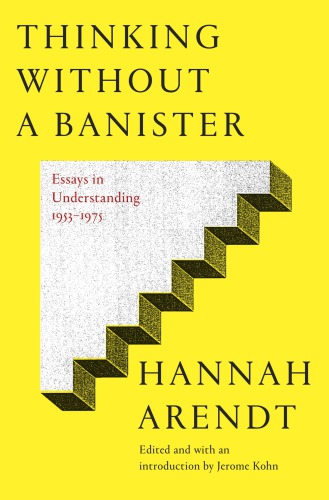
Thinking Without a Banister
Essays in Understanding, 1953-1975
کتاب های مرتبط
- اطلاعات
- نقد و بررسی
- دیدگاه کاربران
نقد و بررسی

January 15, 2018
Cultural and political analysis by a noted and often controversial writer.By 1953, Hannah Arendt (1906-1975) had been recognized as a powerful political theorist whose early writings--collected in Essays in Understanding, 1930-1954--focused largely on understanding and analyzing "a new form of government in the world: totalitarianism." Although totalitarian dictatorships occupied her thoughts for the rest of her life, this second volume of some 40 essays, interviews, conference presentations, acceptance speeches, letters, and reviews, edited and introduced by Arendt scholar Kohn, reveals a wide focus, including the relationship of theory to practice, American elections, the Cold War, freedom, civic responsibility, and happiness. Arendt defined herself as a thinker, not an actor; at a 1972 conference on "The Work of Hannah Arendt," she defended herself against objections to her stance: "I would like to know," asked one participant, "not only what is justice in a world whose injustice we all abhor, but how can the political theorist make us become more committed and more effective in fighting for justice." Arendt responded that she was committed to arousing thought but not "to indoctrinate." Most important to her was inspiring intellectual awakening, taking away "banisters from people--their safe guiding lines" and compelling them to think for themselves. Likewise, she refused to align herself with any political position: "the left think I am conservative," she said, "and the conservatives sometimes think I am left, or I am a maverick or God knows what." Some essays, such as her reflections on the 1960 presidential election that pitted Kennedy against Nixon, seem unfortunately dated. But in other pieces she emerges as startlingly prescient: in an interview in 1973, for example, she emphasized that a free press is crucial in a democracy. "How can anyone have an opinion who is not informed?" she asked; "if everyone lies to you, the consequence is not that you believe the lies, but that no one believes anything at all anymore."A challenging, densely argued, provocative collection.
COPYRIGHT(2018) Kirkus Reviews, ALL RIGHTS RESERVED.

February 15, 2018
Collected from the period that includes Arendt's most popularly known work, Eichmann in Jerusalem, these essays, letters, and other short and complete pieces are cause to celebrate. Among topics addressed in insightful and plain-spoken discourse are how Marxism has been misunderstood; the importance of sound government to public life and public life to human potential; the divergence between the values of Christianity and those of democracy; and the applications of various ethical lenses, including totalitarianism, the 1960 presidential conventions, and imagination as theorized by Immanuel Kant. Reading some of these essays here and now, the shock of how well they relate to current U.S. political realities, may strike a chord with many academic readers but also engage informed general readers as well. Kohn's introduction allows the latter to gain an understanding of how Arendt developed and polished conceptual ideas from concrete experiences as well as philosophical traditions. VERDICT Highly recommended for academic and larger public libraries.--Francisca Goldsmith, Lib. Ronin, Worcester, MA
Copyright 2018 Library Journal, LLC Used with permission.

March 12, 2018
This collection of erudite writings from esteemed political theorist Arendt (1906–1975) consists of essays, reviews, speeches, letters, and interviews published during the latter days of her career. Though perhaps best known for her studies of European totalitarian movements, Arendt took a keen interest in American politics, as shown here. The selections include ruminations on some of the most quintessential events of modern American history, including the civil rights movement and the Vietnam War. In “Kennedy and After,” she reflects on JFK after his assassination, deeming him a great politician who “elevated politics... to a new, higher level.” The book also acts as a continuation of and extensive postscript for some of Arendt’s best-known theories. In an introduction for a revised edition of her classic The Origins of Totalitarianism, she finds a cause for hope in the 1956 Hungarian Revolution, despite its ultimate failure, admitting, “I am not sure that I am right in my hopefulness, but I am convinced that it is as important to present all of the inherent hopes of a present as it is to confront ruthlessly all its intrinsic despairs.” Here and elsewhere, the collection gives rare insights into Arendt’s personal opinions and reflections on her own work. his collection contains a variety that will be illuminating and fascinating for both Arendt novices and experts.

























دیدگاه کاربران